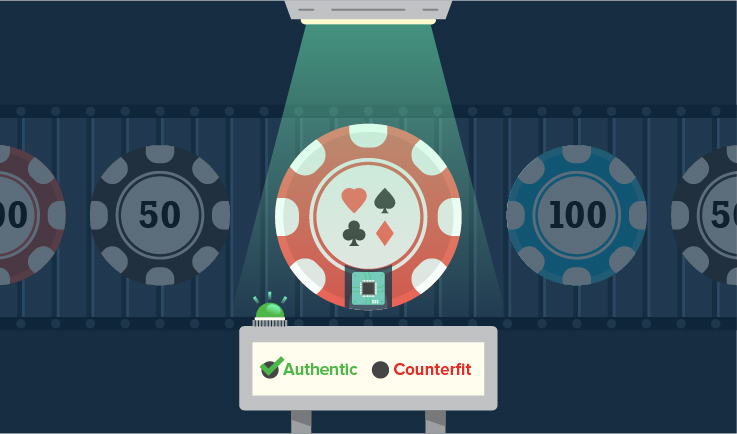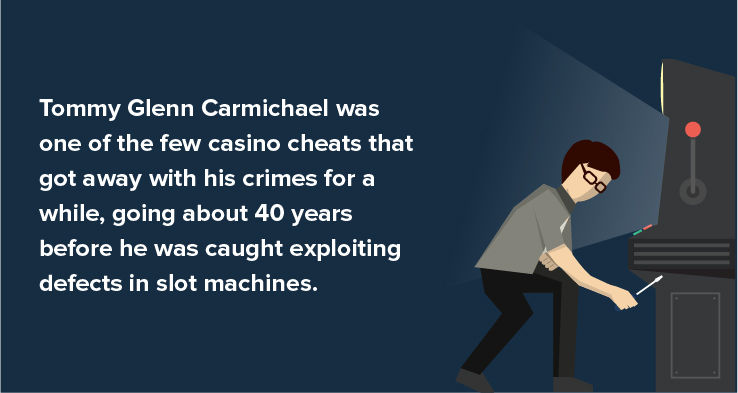Casinos generate nearly $70 billion in revenue every year. Take a second to think about that. Not $70 million, and not $7 billion… $70 billion dollars.
Since they push so much money, it’s hardly surprising that casinos are targeted by scammers who think they’re smart enough to cheat the system. However, very few people are actually able to beat the odds. Worldwide Casino Consulting estimates that fewer than 0.1% of the revenue casinos generate makes its way back to scammers. The few that do scam casinos almost always get caught.
HOW PEOPLE TRY TO CHEAT IN CASINOS
- Relaying information to other players.
- Colluding with the dealer.
- Looking at the dealer’s hands.
- Replacing cards with better ones.
- Past posting.
- Card marking.
- Counterfeit Chips.
- Edge sorting.
Cheating has always been a cause for concern among casinos. Dishonest players have found very inventive ways to try to scam them over the years, so casinos have been forced to constantly improve their security to stay one step ahead of them.
Most people are aware of the high levels of securities modern casinos have, but still think that they can beat the house. Here are some of the ways that people try to cheat, and the different safeguards casinos have put into place to foil them:
Relaying Information to Other Players
Cheaters often work in concert with each other. For instance, one player can try to get a good vantage point of the cards a dealer is holding and use a wireless signal to communicate to the others that are in on the con. Way back in 1973, a team of cheaters hid a transmitter in a pack of cigarette cards to transmit messages between each other. Transmitters have become much more advanced in recent years, but casino fraud detection technology has improved as well.
How casinos prevent it: Casinos have to carefully monitor everyone on the floor, in addition to using special debugging crews to identify illicit communications and zero in on the offending players.
Casinos have also new technology such as NORA to identify teams of cheaters. NORA allows the security team to conduct public records searches to find relationships between their patrons, which enables them to predict if people are going to cheat together.

Colluding with the Dealer
One of the most common ways that people try to cheat the casino is by colluding with the dealer. As an example, the dealer may make a “false shuffle,” meaning that they keep some of the cards in the same order as they were originally dealt.
Last year, John Grochowski of the Casino Times received a commentary from a former blackjack dealer who admitted to colluding with players and got caught. He almost faced prison time, but was able to get off without a criminal record after pleading for leniency. Grochowski said that colluding is probably a felony in every jurisdiction; however, it can only be punished if it’s proven. For this reason, it’s no surprise that today’s casinos monitor their dealers carefully to prevent collusion from taking place.
How casinos prevent it: Casinos pay close attention to their dealers, as well as their players. They not only watch the tables on camera, but they also monitor each dealer’s losses and each player’s winnings. If a lot of players at a given table do much better than expected over a course of time, the house will zero in on the dealer. Dealers know they’re being watched more closely than ever and, consequently, are more reluctant to participate in such scams these days.
Casinos can also require their dealers to take polygraph tests to show that they aren’t cheating. They always subject them to strict background checks to make sure that they aren’t dishonest.
Looking at the Dealer’s Hands
Even honest dealers aren’t perfect. They may accidentally tip their hole card, giving players a look at their hand. Casinos have to make sure that they can’t do this.
How casinos prevent it: Casinos train their dealers carefully to avoid this. They have strict penalties for failing to hold their hole cards properly and dealers can face serious repercussions - even if it was a genuine accident. Players are encouraged to report dealers that tip their cards. Players that aren’t at the right vantage point to see the card are especially likely to report if they feel other players are being given preferential treatment.
Replacing Cards With Better Ones
One of both the most primitive and common ways that players can try to improve their odds is by replacing the card in their hand with a better one. They usually try to pull this off by either sneakily replacing a card with one of their own or collaborating with a player next to them to shuffle cards in and out.
While this sounds like a very simple strategy, some would-be casino cheats have developed very sophisticated techniques to pull it off. Since they know that casinos are watching the tables closely, they use some new tools to switch cards as inconspicuously as possible. Potter & Potter's, for instance, sells a retractable brass holdout that allows players to swap one of the cards in their hand with one that they had stuffed down their sleeve.

Collaborating with other players is another common that people try to cheat in the casinos. They may make an arrangement with an accomplice to meet at a certain table, being careful not to be seen together before the game to avoid raising any suspicions. The two may have a subtle code that they use to communicate with each other, such as a slight cough, that gives them the cover to try and change cards without drawing the dealer’s attention.
How casinos prevent it: Since card switching is one of the most common forms of cheating in casinos, the house is very careful to keep an eye out for it. Dealers have to address this problem by keeping track of all cards on the table. They’re also taught to scrutinize players with long sleeve shirts more carefully to reduce risk.
Keeping track of cards used to be much more difficult, but new tools have enabled the dealer to keep track much more easily. One of the newest tools that dealers use is a dealing shoe known as The Angel Eye.
The casino places a special code on the back of their cards. The Angel Eye reads each card before the deal and records which players received the card. If a player tries to play a card other than the one that they were dealt, whether that’s a card that they brought from home or one that they switched with a neighboring player, then they will be immediately identified.
Tools like The Angel Eye have made it much easier for casinos to catch cheating players. While players could otherwise avoid detection if they were skilled with sleight of hand, this tool has significantly reduced the number of players that get away with card swapping.
Past Posting

Past posting is a scam where players try to replace chips they’ve won with more valuable ones. It can be attempted by people playing blackjack, poker or roulette.
This con requires the scammer to be even more skilled with sleight of hand techniques than those that try to swap cards. Past posting is nearly impossible to get away with these days, because tables are closely monitored on close circuit cameras. Some players that are highly skilled with sleight of hand may be able to get away with post packing a couple of chips once or twice, but accumulating enough chips to make their scam worthwhile almost inevitably leads the casinos to become suspicious.
There are other forms of past posting that players have attempted as well. In roulette, players may try to place bets after the ball has already landed in the pocket. This is a lot more difficult to pull off, because it requires distracting the dealer. Dealers are trained to avoid distractions, making it challenging to pull off without a very effective diversion.
How casinos prevent it: Dealers have been trained to pay close attention to the chips on the table to make sure that they aren’t switched. Players are also watched very carefully by security these days. If a player is trying to cash in an unusual number of chips, the casino may require them to wait while they review the casino footage to verify that the player won their chips legitimately. If the player was replacing chips at the tables, security will catch them and have them removed.
Card Marking
As its name implies, card marking involves making subtle marks on cards so that the player can distinguish them later through the use of infrared lenses and invisible ink.
This is a much newer form of cheating than switching cards, though a lot of cocky scammers have already attempted it, thinking that casinos aren’t smart enough to catch them in the act. Apparently they think they’re the first to come up with the idea. However, since the development of invisible ink, casinos have been developing new ways to catch players marking cards.
How casinos prevent it: Card marking used to be a highly popular form of cheating, until casinos started using riffle tests to identify marked cards. Here’s how a riffle test works:
- The dealer riffles the cards from the bottom of the deck several times.
- They carefully look at the cards and see if there is any animated effect.
- If they see any type of movement, they’ll know that the cards have been marked with visible ink.
In more recent years, some scammers have tried using infrared lenses with invisible ink to pick out cards that they have marked. Most casino cheats aren’t this savvy or dedicated, but even those who are have a low success rate. Dealers in many casinos are using infrared lenses themselves to easily identify cards that have been marked, in addition to playing close attention to the particular hands that players make to figure out which player marked the cards.
Counterfeit Chips

Some players try to create counterfeit chips and cash them in for money. Of course, this takes a very high level of sophistication, as the counterfeit chips need to look nearly identical to the chips the casino itself holds.
How casinos prevent it: Getting away with cashing in counterfeit chips is far more difficult than it used to be. Most casinos use RFID tracking these days, enabling them to tell quickly if a counterfeit chip is being used. These RFID transmitters are installed in chips worth at least $20, as they’re the ones most likely to be counterfeited. The chips must be scanned over an RFID reader before they can be cashed in; if they don’t pass the test, the individual can be taken into custody on the spot.
This technology has also come in handy during robberies. In 2010, Anthony Carleo tried stealing $1.5 million worth of casino chips during a robbery. The casino was able to deactivate the RFID tracking so that the Carleo wouldn’t be able to cash them in. He was later arrested after trying to sell them to an undercover officer.
Edge Sorting
Edge sorting is more an opportunistic type of scam. Highly observant players look out for small defects in cards. While it may seem as if the player is just taking advantage of an opportunity available to them, edge sorting is a violation of casino policy and can get players booted from the tables.
How casinos prevent it: Since edge sorting requires players to notice existing defects, it’s one of the easiest types of cheating to prevent, if casinos take the right precautions.
Casinos usually use new cards to minimize the chance that they’ll have any noticeable defects on them. They also tend to use cards from multiple decks for many games, which means that a particular defect could be present on more than one card. This can make it difficult for players to tell which card is in play.
CASES OF CHEATING GONE WRONG
There are a number of people that have tried getting away with cheating the casinos. Some of them were actually very clever, but still wound up getting caught. Here are some of these failed cheaters:
Tony Ahn
Even casino security experts don’t seem to know how to get away with cheating - and Tony Ahn is a classic example. An former casino employee himself, Ahn colluded with several other people to try to rip off one of his past employers by beating their slot machines. Despite his detailed knowledge of the games, he was still caught and later sent to prison.
Bruce Koloshi
Bruce Koloshi was a New Jersey player who visited a casino in Louisiana, where he tried marking the cards with invisible ink. He was caught on camera, and while authorities said that he was one of the most sophisticated cheats they’d ever seen, he was still caught and charged in the end.
Phil Ivey
Phil Ivey is one of the wealthiest poker players in the world. You’d think he wouldn’t need to cheat to pad his pockets, but he was still involved in a scandal last year when he tried to get ahead via edge sorting. In playing, he noticed subtle defects in some of the playing cards and allegedly worked with a Chinese dealer to make sure particular cards were dealt to him. The Borgata Hotel Casino & Spa sued him for $9.6 million after catching him.
Archie Karas
Archie Karas is another world renowned poker player that got busted for cheating. Karas’s claim to fame was that he turned $50 into $40 million in just three years. The 62 year-old poker champion was highly respected, until he was caught marking cards at a California card room.
Karas was indicted by the San Diego District Attorney’s office and was eventually convicted and sentenced to three years probation.
Tommy Glenn Carmichael

Tommy Glenn Carmichael was one of the few casino cheats that got away with his crimes for a while, going about 40 years before he was caught exploiting defects in slot machines to score winnings illegally. Those defects were eventually corrected, but he ended up finding different ways to cheat them with a new light wand, which he sold to other people.
The ability to get away with these kinds of scams has dropped dramatically in recent years. Casinos are closely monitoring their machines for defects, which makes it difficult for the “Tommy Carmichaels” of the world to get away with these types of scams. It’s also important to remember that Carmichael was arrested four times for cheating. Nowadays, facial recognition software can identify known cheats like him immediately and ban them from the premises.
THE CONSEQUENCES OF CHEATING
Since cheating is the biggest concern most casinos have to worry about, many of them have developed very strict consequences to discourage it. There are a number of different deterrents that casinos have used that have proven to be very effective, including the following most common punishments that prospective casino scam artists should keep in mind:
Banning from the Establishment
For casinos, it isn’t always worth the effort of charging cheaters, especially if the cheaters only tried stealing a small amount of money. Instead, the most common way that casinos punish cheating players is by permanently banning them. They carefully monitor people that consistently walk away with big winnings, because there is a very good chance that they have been cheating.
Further, lifetime bans aren’t uncommon for troublemakers of any sort. Casinos are quick to ban people they simply don’t like - even if they haven’t been caught cheating before. They’ve even banned famous celebrities like former Philadelphia 76ers shooting guard Allen Iverson for throwing chips at dealers and getting into other minor alterations.
These bans don’t even need to be limited to the specific casinos where cheaters were caught. Archie Karas, for example, was banned from all Nevada casinos for cheating, and he’ll never be allowed in again the rest of his life. Talk about big stakes that should make would-be cheaters take note.
Use of Force.
Casinos aren’t supposed to use force, except in very limited circumstances. However, it’s still a consequence that players need to be aware of. A security guard at the Bellagio Casino was caught on tape roughing up a suspect this year, which should be a lesson to everyone to be cautious about cheating.
This incident sparked a discussion about the use of force that security guards are allowed to use. While they don’t legally have the right to assault players, they can justify the use of force if they feel they’re at risk. And while it would be difficult to prove, they may even look for ways to justify it if they’re dealing with high profile cheaters.
Prison Time

Jail time is, understandably, the most serious consequence a player can receive. Not all players who cheat will be prosecuted, but those that are caught trying to steal a substantial amount of money or that have developed a very sophisticated type of scam are probably more likely to end up in the slammer.
The penalties for cheating can range significantly depending on jurisdiction and the offense. Some cheaters have gone away for as little as nine days, while others can be imprisoned for years. Derek Bethea, for instance, was sentenced to 17 years for cheating - representing a pretty severe deterrent for others.
It’s also worth keeping in mind that casinos in many jurisdictions have very strong lobbying groups that are able to push for severe laws. Gaming regulators are also ready to press charges against serious cheaters, as they pose a threat to other players in the casino and to the casino itself.
CHEATERS NEVER WIN
Ultimately, cheaters have always been the biggest threat to casinos, posing a greater risk than theft, break-ins or other disruptions. And while casino operators have adapted their fraud controls over the years to catch scammers, they’re still constantly trying to learn more about the newest scams cheaters are using in order to prevent them. Technologies like closed circuit television and tools for detecting marked cards have played a key role in reducing losses from casino scams, as have behavioral analysis advances that help casinos identify suspicious behavior quickly..
Over time, we’ve seen that these precautions have proven to be very effective - even cheaters that have tried to pull off sophisticated scams with invisible ink and other new tools have still been caught.
Our advice? Stick to studying casino games and finding smart ways to increase your odds. You’ll earn far more in the long run when you consider that cheaters never win.


